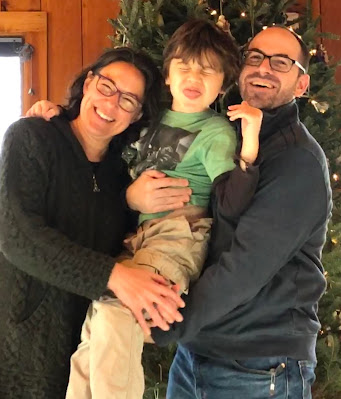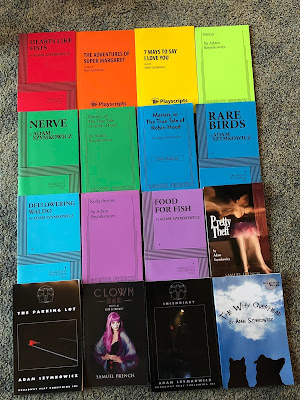Hi Everybody! Here is our Christmas Card.
I had a breakthrough case of covid a few months back after being fully vaxxed and was mostly just really tired for a couple of days. Luckily, I managed to not pass it on to my family somehow. (Masked and living in the basement)
One milestone I hit this year was having a play done 100 times -- a one act that was published in 2015 had its one hundredth production this year.
2020
Writingwise, I finished writing my second YA novel, and wrote half of a Middle Grade novel, wrote 60 one-minute monologues, finished a forty-minute play called 100 Things I Never Told You that I'd started at the beginning of the pandemic, wrote a 20-minute film for some Juilliard students and wrote one full length play.
When I look at that, it's actually a lot of writing, even if I feel like I didn't do all that much.
I did only 10 interviews this year, partially because I think people just aren't into being interviewed right now and partially because it was hard for me.
I read a lot of books this year and quite a few plays but I didn't count them so I don't know how many.
Also up until this year, the most productions I've had from a full length has been 11 in a single year. Kodachrome had 14 this year which is kind of amazing during a pandemic. Most of them are at schools who are still doing work right now.
I had 32 productions this year, not as many as 47 in '19 but more than last year's 20.
These 32 were-- 2 of The Parking Lot, 1 of The Book Store, 1 The Wooden Heart, 14 Kodachrome, 1 Elsewhere (which hadn't been done in 10 years), 6 Marian Or the True Tale of Robin Hood, 5 Clown Bar, 1 Nerve, 1 Hearts Like Fists.
My night of one acts, 7 Ways To Say I Love You had 1 production.
I also had some fancy readings including Such Small Hands at Northlight and a zoom workshop of Hearts Like Planets with Chance Theater.
BPPI published my play The Parking Lot and Sam French/Concord put out a teen version of Marian. Playscripts is going to publish a couple more-- The Book Store is now able to be read on its site.
I know of 17 or so planned productions for 2022 including the premiere (finally) of Clown Bar 2. This is a lot considering we're still in the thick of it. And again, it's mostly schools. I don't know when more of the small theaters who have been my mainstay will be back and I know some of them won't.
I don't mean to end on a bleak note. I just want to acknowledge that my momentum on a life in the theater has taken a huge hit and I know some people were hit a lot harder. The pipeline has never been more clogged up so even sending plays out right now seems more pointless than usual. And there is a big question about when or if the normal level of theater producing will return. Especially for small theaters without spaces or small theaters who lost their spaces.
So it takes a lot more hope than normal to keep writing. And I want to acknowledge that.
Love to you and yours. Here are my previous years in review.
2018
2017
2016
2015
2014
2013
2012
2011
2010
2009
2008
2007
2017
2016
2015
2014
2013
2012
2011
2010
2009
2008
2007
---------------------------------------------------------------------------------------------------------
-----------------------------------------------------------------------------------------------------------
Support The Blog
-----------------------------------------------------------------------------------------------------------
-----------------------------------------------------------------------------------------------------------
Support The Blog
-----------------------------------------------------------------------------------------------------------
| Mailing list to be invited to Adam's events |
| Email: |
------------------------------------------------------------------------------------------------------------
Books by Adam (Amazon)






